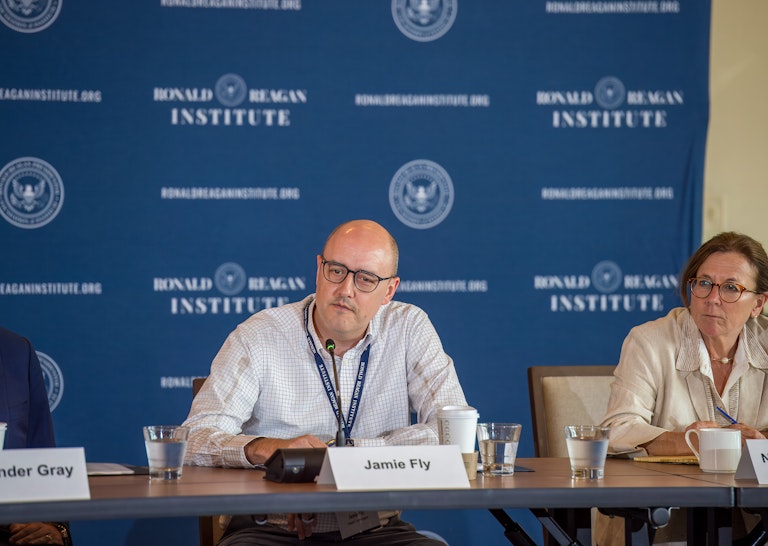Ronald Reagan Institute
The Trump Administration’s Foreign Policy Goals: A Hemispheric Defense of U.S. Interests
By Jamie Fly

After 20 years of seemingly endless war, many Americans are skeptical about what the United States can achieve abroad. It is thus not surprising that the Trump Administration has prioritized the Western Hemisphere in its early second-term foreign policy.
The Biden Administration left America’s borders unsecured and communities across the United States vulnerable to uncontrolled migration and illicit drugs. President Biden did little to prevent America’s authoritarian foes from expanding their influence in key strategic regions, including our own. A focus on the near abroad thus reinforces the Trump Administration’s top priority of securing the border and frames American international engagement in a way that is appealing to a weary electorate.
But President Trump has gone a step further, by promoting the idea of American expansionism, focusing repeatedly on the Panama Canal and Greenland—and occasionally on Canada. This is politically uncertain territory. Whatever the merits of ensuring that America’s authoritarian challengers do not continue to gain a foothold in our neighborhood, polls show that most Americans do not favor the annexation of new territories.[i]
The president’s focus on territorial expansion also risks undermining the administration’s ability to achieve the very hemispheric goals it outlines. Greenland and Panama are unlikely to become U.S. territories. Canada even less so. Whatever strategic goals that the United States has in increased U.S. access to Greenland could have already been an early Trump victory, if serious proposals had been made quietly to America’s Danish allies. After some public threats, the Trump administration claimed that the Panamanian government agreed to allow fee-free travel for U.S. military warships, but this has been disputed by the Panama Canal Authority. After Trump administration pressure, the sale of two key canal assets by their Hong Kong owners was announced, only to be reversed after Beijing intervened. Meanwhile, President Trump’s attacks on Canada have led to a surge of Canadian nationalism, powered Canada’s Liberals to re-election, and caused real economic consequences for many Americans and their communities.[ii] A lighter touch by Washington would have likely led to more advantageous outcomes in each of these cases.
Beneath the allure of a supposedly more secure and prosperous Western Hemisphere with a newly enlarged United States of America at its center lies a fundamental question. What is the Trump Administration’s global grand strategy? Is the United States just one power exercising a narrow sphere of influence in an increasingly contested world as the other great powers exert control over their neighborhoods? In 2025, Americans do not want never-ending overseas entanglements but for more than 125 years, most have not viewed the ultimate goal of American greatness to be limited to keeping the Caribbean safe for American commerce.
So the key question for the Trump Administration is: What is the United States willing to do to advance its interests in the rest of the world at a time when the relevance of proximate security is declining and technology and advanced weapons have the potential to bring global threats to our doorstep and into our supply chains, our power grids, and our computer networks?
The surest way to defeat Russian, Chinese, or Iranian influence in our own hemisphere and to deter looming attacks on the homeland is to pressure those regimes in their backyard and ensure that they do not have the bandwidth or economies to confront us on our doorstep. On that count, we've seen little to reassure Americans that the Trump Administration is up to the challenge.
Foremost is the threat posed by the Chinese Communist Party (CCP). Despite the prominence of Asia-first prioritizers in the Trump Administration, China continues to rapidly expand its military capabilities and increase its economic and diplomatic influence globally. It has reportedly infiltrated our telecommunications networks, continues to have unfettered access through its CCP-run social media platform TikTok to the next generation of Americans, is able to procure advanced U.S. manufactured AI chips, is helping Russian deepen its assault on Ukraine and threaten European security, and empowering rogues like Iran and North Korea as they terrorize U.S. allies. Despite the Trump Administration’s focus on the Western Hemisphere, Beijing continues to expand its strategic engagements in our own neighborhood even gaining new members from the Western Hemisphere for its Belt and Road Initiative.[iii]
The notion that the United States of America can hide in our own hemisphere, with or without Greenland, while China becomes the world’s foremost political power is woefully short-sighted. As then-Senator Marco Rubio often reminded us, “China is the most powerful adversary the United States has faced in living memory.”[iv] No American partner, in our hemisphere or elsewhere, will choose to side with an increasingly isolationist or Western-Hemisphere focused America against such a powerful adversary if they believe America is stepping back from its global commitments and does not have a compelling alternative to offer.
During his first term in office, President Trump’s team outlined an ambitious and coherent strategy to counter the CCP, warning U.S. allies of the dangers of reliance on the false allure of Chinese trade and investment, limiting Beijing’s access to key materials and technologies, weakening Beijing at home, strengthening partnerships in the Indo-Pacific, and blocking Chinese expansion in other key regions. While it is early, there are not many signs that the second Trump term has anything close to this strategic approach or the wherewithal to implement such a strategy.
In fact, many of the Trump Administration’s early actions that have been taken under the rubric of cost savings and retrenchment, driven primarily by the Department of Government Efficiency (DOGE), have undermined America’s capabilities to counter China. The international affairs budget is being gutted and U.S. foreign assistance devastated as China expands its programs.[v] Chinese communist propaganda is now being broadcast in Africa, East Asia, Central Asia, and in Latin America on frequencies and TV stations once controlled by U.S. international broadcasters.[vi] The scientific research programs and student visas that attracted the world’s best and brightest to America are being slashed or paused, and the talent is beginning to go elsewhere.[vii]
President Trump has initiated a trade war with Beijing but now appears more intent on finding off-ramps than pursuing decoupling or at least using the restrictions to America’s strategic advantage or that of our allies. Meanwhile, the leadership shown by key figures during President Trump’s first term on human rights issues like Hong Kong, the Uighurs, and Tibet is nowhere to be found this time around. The Trump administration even appears to be reversing recent precedent and weakening U.S. support for Taiwan.[viii]
The Trump Administration has committed to continue to increase defense spending, and the State Department has prioritized increased American embassy support for U.S. companies abroad, but defense or economic competitiveness alone are not going to deter Chinese global dominance.
That is why a renewed focus on the Western Hemisphere is short-sighted without placing our hemispheric challenges in the context of America’s broader worldview. What are our goals in the world? Who are our enemies? Who are our friends? These are fundamental questions that the American public has wavered on in the wake of the wars in Iraq and Afghanistan. These are questions that the Trump Administration has yet to answer, but the early indications do not reassure that the Western Hemisphere-first approach is anything more than a cover for those in the administration who would advocate for quasi-isolationism.
America has always been a country founded on universalist ideals. The founders embraced a revolutionary vision that they believed applied to all humans, everywhere. Generations of Americans have been raised believing that we are not just another country, but that we represent something greater than our narrow individual interests and have a duty to assist those who aspire to enjoy the freedom we cherish.
Unless we want our children and grandchildren to live in a world dominated by China, we need more than a hemispheric strategy. We need a global strategy to advance our interests and counter our authoritarian challengers.
[i] Aaron Blake, “Trump’s Panama, Greenland Gambits: A Bold Idea Few Are Really Asking For,” Washington Post, January 23, 2025, accessed June 10, 2025, https://www.washingtonpost.com/politics/2025/01/23/trumps-panama-greenland-gambits-bold-idea-few-are-really-asking/.
[ii] “Effects of the Trump Administration’s Tariff Threats Against Canada and Mexico,” Center for Strategic and International Studies, April 2025, accessed June 10, 2025, https://www.csis.org/analysis/effects-trump-administrations-tariff-threats-against-canada-and-mexico.
[iii] “Colombia Signs Up to China’s Belt and Road Initiative,” DW, May 14, 2025, accessed June 10, 2025, https://www.dw.com/en/colombia-signs-up-to-chinas-belt-and-road-initiative/a‑72534659.
[iv] Marco Rubio, “The World China Made: ‘Made in China 2025’ Nine Years Later,” Office of Senator Marco Rubio, May 18, 2024, accessed June 10, 2025, https://www.americanrhetoric.com/speeches/PDFFiles/Marco-Rubio-The-World-China-Made.pdf.
[v] U.S. Global Leadership Coalition, “U.S. International Assistance and Diplomacy Cuts on Competition with China,” March 2025, accessed June 10, 2025, https://www.usglc.org/media/2025/03/BRIEF-U.S.-International-Assistance-and-Diplomacy-Cuts-on-Competition-with-China.pdf.
[vi] Kelly Ng, “‘Discarded like a dirty rag:’ Chinese state media hails Trump’s cuts to Voice of America,” BBC News, March 18, 2025, accessed June 10, 2025, https://www.bbc.com/news/articles/cvgwzmj9v34o.
[vii] Catherine Gaschka and Lorne Cook, “Europe launches a drive to attract scientists and researchers after Trump freezes US funding,” Associated Press, May 5, 2025, accessed June 10, 2025, https://apnews.com/article/europe-us-science-funding-researchers-6a769e6d40c5127d59797e44a2470cfe.
[viii] “Donald Trump Blocks Taiwan’s President Lai Ching‑te from New York Stopover,” Financial Times, July 28, 2025, accessed July 30, 2025, https://www.ft.com/content/21575bec-5cdd-47ee-9db2-3031c4ea7ca7
Join Our Newsletter
Never miss an update.
Get the latest news, events, publications, and more from the Reagan Institute delivered right to your inbox.
